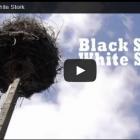Blavascunas, Eunice and Jodie Baltazar. Black Stork, White Stork. 2014. DV, 43 min. https://www.youtube.com/embed/2bW8Qm3JvqY.
Black Stork, White Stork looks at the cultural transitions taking place in a Polish village in the Białowieża Forest, Europe’s last primeval forest, which transformed from a farming and foresting hamlet to an eco-tourist outpost after the fall of communism. The film investigates what happens to people living in conservation zones when they lose a practical relationship with nature; how do they re-invent themselves using new social connections when conservation has reshaped the possibilities for human and animal life? It tells of the life of Leszek Szumarksi (“Black Stork”), an aging misfit bachelor, and his less charismatic brother, Mirek (“White Stork”), who, like the birds that symbolize them, struggle to adapt to changing economic and nature paradigms. As a “living legend” of the Białowieża Forest, Leszek negotiates his status in this new world in unusual and sometimes conflicting ways, defying many stereotypes as he shares stories from his life in and expertise about the forest. His best friend is a famous environmental journalist, yet he claims that environmentalists have “messed people up” even more than the forest. Black Stork, White Stork provides a surprising, endearing, and sometimes sad story about how Leszek manages conflicts and alliances. The film was filmed over the course of two years and represents cultural anthropologist Eunice Blavascunas’s relationships with villagers and artist/filmmaker Jodie Baltazar’s insights into storytelling and human nature. (Source: Eunice Blavascunas)
© 2014 Eunice Blavascunas and Jodie Baltazar. To order a copy of the film please contact: blavascunas@yahoo.com. Film used with permission.
- Hunka, Agnieszka D., Wouter T. de Groot, and Adam Biela. "Visions of Nature in Eastern Europe: A Polish Example." Environmental Values 18, no. 4 (2009): 429–52. doi: 10.3197/096327109X12532653285777.


